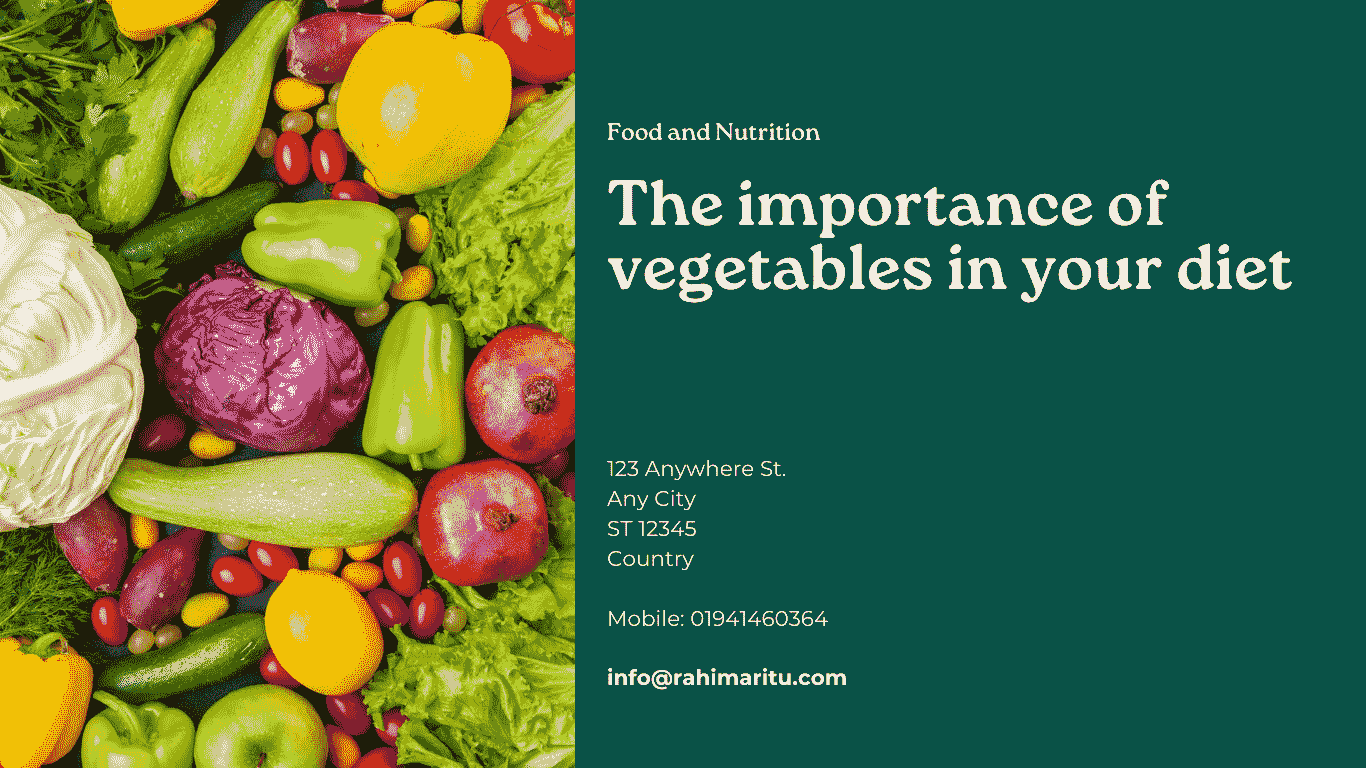
The importance of vegetables in your diet
Importance of Vegetables
A diet rich in vegetables can lower blood pressure, reduce the risk of heart disease, and prevent some types of cancer. Also it helps with digestive problems and lower risk of the eye.
Health Benefits
Vegetables are full of vitamins, minerals and antioxidants, which is very important for the body. Carrots are known for Vitamin A, Which plays an important role for eye health. Vegetables are an essential component of a balanced and healthy diet, providing a wide array of nutrients that contribute to overall well-being. Here are some key reasons why vegetables are important and the health benefits they offer:
- Nutrient-rich: Vegetables are packed with essential vitamins, minerals, and antioxidants that are vital for various bodily functions. These nutrients play crucial roles in maintaining good health, supporting immune function, and preventing chronic diseases.
- Disease prevention: Regular consumption of vegetable has been linked to a reduced risk of chronic diseases such as heart disease, diabetes, and certain types of cancers. The fiber, antioxidants, and phytochemicals found in vegetable contribute to these protective effects.
- Fiber content: Vegetables are an excellent source of dietary fiber, which is important for digestive health. Fiber aids in maintaining a healthy weight, regulating blood sugar levels, and preventing constipation.
- Low in calories: Most vegetables are low in calories and fat, making them a nutritious choice for those looking to manage their weight. They provide essential nutrients without contributing to excessive calorie intake.
- Hydration: Many vegetables have a high water content, contributing to hydration and helping maintain a healthy balance of fluids in the body.
- Eye health: Vegetables such as carrots, spinach, and kale are rich in compounds like beta-carotene and lutein, which are beneficial for eye health and may reduce the risk of age-related macular degeneration and cataracts.
- Heart health: The potassium, fiber, and antioxidants in vegetable contribute to cardiovascular health by helping to lower blood pressure, reduce cholesterol levels, and support overall heart function.
- Blood sugar control: The fiber and complex carbohydrates found in vegetables can help regulate blood sugar levels, making them important for individuals with diabetes or those at risk of developing the condition.
- Anti-inflammatory properties: Many vegetable contain anti-inflammatory compounds that may help reduce inflammation in the body, contributing to the prevention of chronic inflammatory conditions.
- Digestive health: The fiber in vegetable supports a healthy digestive system by promoting regular bowel movements and fostering the growth of beneficial gut bacteria.

Health Benefits
Improved digestive health
Vegetables are a good source of fibre. This fibre is a type of carbohydrate that helps pass the food through digestive problems. Study says that fibre also helps to improve vitamin and Mineral absorption in the body. It could raise our energy levels. Improving digestive health involves adopting lifestyle and dietary habits that support the proper functioning of your digestive system. Here are some tips to help enhance your digestive health:
- Eat a High-Fiber Diet:
-
-
- Include a variety of fiber-rich foods in your diet, such as whole grains, fruits, vegetables, legumes, and nuts. Fiber helps promote regular bowel movements and supports a healthy digestive tract.
-
- Stay Hydrated:
-
-
- Drink plenty of water throughout the day. Water helps soften stool, making it easier to pass, and supports overall digestion.
-
- Probiotics:
-
-
- Consume foods rich in probiotics, such as yogurt, kefir, sauerkraut, kimchi, and other fermented foods. Probiotics are beneficial bacteria that support a healthy balance of gut flora, aiding digestion.
-
- Prebiotics:
-
-
- Include prebiotic-rich foods in your diet. Prebiotics are fibers that feed the beneficial bacteria in your gut. Foods like garlic, onions, bananas, asparagus, and leeks are good sources of prebiotics.
-
- Chew Your Food Thoroughly:
-
-
- Chew your food slowly and thoroughly. This not only aids in the mechanical breakdown of food but also allows digestive enzymes in your saliva to begin the digestive process.
-
- Regular Meals and Snacking:
-
-
- Aim for regular meal times and include healthy snacks between meals if needed. Consistent eating patterns can help regulate digestion.
-
- Limit Processed Foods:
-
-
- Minimize the intake of highly processed and refined foods, as they may lack the fiber and nutrients necessary for optimal digestion.
-
- Limit Fatty Foods:
-
-
- High-fat foods can slow down digestion. While healthy fats are essential, try to consume them in moderation and choose sources like avocados, nuts, and olive oil.
-
- Manage Stress:
-
-
- Chronic stress can negatively impact digestive health. Practice stress-reducing activities such as deep breathing, meditation, yoga, or regular exercise.
-
- Exercise Regularly:
-
-
- Physical activity can promote regular bowel movements and support overall digestive health. Aim for at least 30 minutes of moderate exercise most days of the week.
-
- Limit Caffeine and Alcohol:
-
-
- Excessive caffeine and alcohol intake can irritate the digestive tract. Limit your consumption and stay within recommended guidelines.
-
- Avoid Overeating:
-
- Practice portion control and avoid overeating. Eating smaller, more frequent meals may be easier on your digestive system.
-

Improved digestive health
Lower blood pressure
Many green vegetable contain potassium. Potassium helps the kidneys filter sodium out of your body, which can reduce blood pressure. Including vegetables in your diet is important for maintaining lower blood pressure and overall cardiovascular health. Here are several ways in which vegetable contribute to blood pressure regulation:
- Rich in Potassium: Many vegetables, such as leafy greens, potatoes, sweet potatoes, tomatoes, and beans, are excellent sources of potassium. Potassium helps balance sodium levels in the body, and a higher potassium intake has been associated with lower blood pressure.
- Dietary Fiber: Vegetables are high in dietary fiber, which has several benefits for heart health. Fiber helps regulate blood sugar levels and reduces cholesterol levels, contributing to better blood pressure control.
- Antioxidants: Vegetable contain a variety of antioxidants, such as vitamins C and E, beta-carotene, and other phytochemicals. These compounds help protect blood vessels from damage and inflammation, promoting a healthier cardiovascular system.
- Nitrate-Rich Vegetables: Some vegetables, particularly leafy greens like spinach and arugula, are rich in nitrates. Nitrates have been shown to have a positive impact on blood pressure by promoting the production of nitric oxide, which helps relax blood vessels and improve blood flow.
- Low in Sodium: Whole, unprocessed vegetables are naturally low in sodium, which is important for individuals looking to manage or lower their blood pressure. High sodium intake is associated with increased blood pressure.
- Weight Management: Vegetables are low in calories and high in nutrient content, making them a valuable component of a weight-conscious diet. Maintaining a healthy weight is important for blood pressure control.
- Magnesium Content: Some vegetables, such as leafy greens, nuts, and seeds, are good sources of magnesium. Magnesium helps regulate blood pressure by relaxing blood vessels.
- Reduced Risk of Chronic Diseases: Regular consumption of vegetable is associated with a lower risk of chronic diseases, including cardiovascular diseases. A diet rich in vegetables contributes to overall health, reducing the likelihood of conditions that can affect blood pressure.

Lower blood pressure
Lower risk of heart disease
Vitamin K building up your arteries. Green leafy vegetable contain Vitamin K. Which will provide you Calcium. This can help to lower arterial damage and prevent many heart health complications. Vegetable play a crucial role in promoting heart health and reducing the risk of heart disease. Here are several ways in which vegetables contribute to cardiovascular well-being:
-
- Fiber Content: Vegetables are rich in dietary fiber, which has been consistently linked to a lower risk of heart disease. Fiber helps lower cholesterol levels, regulate blood sugar, and support overall cardiovascular health.
- Antioxidants: Vegetables contain a variety of antioxidants, such as vitamins A, C, and E, as well as phytochemicals. These compounds help protect the arteries from damage caused by free radicals, reduce inflammation, and contribute to a healthier cardiovascular system.
- Potassium: Many vegetables, including leafy greens, potatoes, and tomatoes, are excellent sources of potassium. Potassium helps regulate blood pressure by balancing sodium levels in the body and promoting the relaxation of blood vessels.
- Nitrate-Rich Vegetables: Some vegetables, like beets and leafy greens, are high in nitrates. These nitrates can be converted into nitric oxide in the body, which helps dilate blood vessels, improve blood flow, and regulate blood pressure.
- Low in Saturated Fat and Cholesterol: Vegetables are naturally low in saturated fat and cholesterol, making them heart-healthy choices. Diets low in saturated fat and cholesterol contribute to better cardiovascular health and a reduced risk of heart disease.
- Weight Management: Vegetables are nutrient-dense and low in calories, making them an excellent choice for those looking to manage their weight. Maintaining a healthy weight is important for reducing the risk of heart disease.
- Blood Sugar Control: The fiber and complex carbohydrates found in vegetables contribute to better blood sugar control. Managing blood sugar levels is essential for preventing diabetes, a condition that increases the risk of heart disease.
- Lowering LDL Cholesterol: Some vegetables, such as eggplant and okra, contain soluble fiber that can help lower LDL (low-density lipoprotein) cholesterol levels, also known as “bad” cholesterol.
- Reducing Inflammation: Chronic inflammation is a risk factor for heart disease. Antioxidants and anti-inflammatory compounds in vegetables can help reduce inflammation and protect the heart.
- Magnesium Content: Vegetables like leafy greens, nuts, and seeds are good sources of magnesium, which plays a role in maintaining a healthy heart rhythm and blood pressure.
Diabetes Control
The American Diabetes Association recommended at least 3 to 5 servings per day like broccoli, carrots or cauliflower. Vegetables are rich in fibre, which helps to optimal digestion. Also they have low glycemic index. So blood sugar won’t increase after a meal. Vegetable are an essential component of a diabetes-friendly diet and play a crucial role in helping control blood sugar levels. Here are several ways in which vegetable contribute to diabetes control:
- Low Glycemic Index (GI): Most non-starchy vegetables have a low glycemic index, meaning they have a minimal impact on blood sugar levels. Incorporating low-GI foods helps prevent rapid spikes and crashes in blood glucose.
- High Fiber Content: Vegetables, especially non-starchy ones like leafy greens, broccoli, cauliflower, and peppers, are rich in dietary fiber. Fiber slows down the digestion and absorption of carbohydrates, helping to stabilize blood sugar levels.
- Nutrient Density: Vegetables are packed with essential vitamins, minerals, and antioxidants, providing valuable nutrients without significantly affecting blood sugar. These nutrients are important for overall health and well-being.
- Improved Insulin Sensitivity: Some studies suggest that a diet rich in vegetables may improve insulin sensitivity, allowing the body to use insulin more effectively and regulate blood sugar levels more efficiently.
- Weight Management: Including a variety of vegetable in your diet can contribute to weight management. Maintaining a healthy weight is important for individuals with diabetes, as excess weight can contribute to insulin resistance.
- Reduced Risk of Complications: A diet rich in vegetables has been associated with a lower risk of diabetes-related complications, such as cardiovascular disease. Vegetable contribute to overall health, reducing the risk of conditions that can be exacerbated by diabetes.
- Antioxidant Protection: Antioxidants found in vegetables help protect cells from oxidative stress. This is important for people with diabetes, as oxidative stress is associated with complications such as diabetic neuropathy and cardiovascular disease.
- Hydration: Many vegetables have a high water content, contributing to hydration. Staying well-hydrated is essential for overall health and can help manage blood sugar levels.
- Portion Control: Non-starchy vegetables are generally low in calories and carbohydrates, allowing for larger portions without a significant impact on blood sugar levels. This can help with portion control and satiety.
- Blood Pressure Regulation: Some vegetables, such as leafy greens and beets, contain nutrients that contribute to blood pressure regulation. People with diabetes often have an increased risk of hypertension, and managing blood pressure is crucial for overall health.
Nutrition
Vegetables are rich in Vitamin B, folate. Vitamin B, Folate helps make new red blood cells. Folate is good for children’s health and also reduces the risk of cancer and depression.

Nutrition
Vegetables have Some essential minerals like:
- Copper
- Magnesium
- Zinc
- Phosphorus
- Selenium
Here are some vegetables known for their rich nutritional profiles:
- Leafy Greens:
- Spinach
- Kale
- Swiss chard
- Collard greens
- Romaine lettuce
- Cruciferous Vegetables:
- Broccoli
- Cauliflower
- Brussels sprouts
- Cabbage
- Kale
- Root Vegetables:
- Sweet potatoes
- Carrots
- Beets
- Turnips
- Radishes
- Colorful Vegetables:
- Bell peppers (red, green, yellow)
- Tomatoes
- Eggplant
- Zucchini
- Squash
- Allium Vegetables:
- Onions
- Garlic
- Leeks
- Shallots
- Legumes:
- Beans (black beans, kidney beans, chickpeas)
- Lentils
- Peas
- Nightshade Vegetables:
- Tomatoes
- Bell peppers
- Eggplant
- Gourds:
- Pumpkin
- Butternut squash
- Acorn squash
- Herbs and Greens:
- Parsley
- Cilantro
- Basil
- Watercress
- Arugula
- Sea Vegetables:
- Seaweed (nori, dulse, kelp)
Including a variety of vegetables from different groups ensures that you receive a diverse range of nutrients. Remember to eat vegetables of various colors, as different pigments often indicate different types of phytochemicals and antioxidants.
When planning your meals, try to fill your plate with a mix of vegetable from different categories. Aim for a rainbow of colors, as this often indicates a diverse array of nutrients. Additionally, consider preparing vegetable using various cooking methods, such as steaming, roasting, or sautéing, to maintain their nutritional value.
Nutrients per serving
The specific nutrient content of vegetable can vary widely depending on the type of vegetable, its size, preparation methods, and other factors. Below are some common nutrients found in vegetables, along with examples of their average content per serving. Keep in mind that these values are approximate and can vary:
- Leafy Greens (e.g., Spinach, Kale):
- Vitamins (A, C, K)
- Folate
- Iron
- Calcium
- Fiber
- Potassium
- Cruciferous Vegetables (e.g., Broccoli, Cauliflower):
- Vitamins (C, K)
- Folate
- Fiber
- Antioxidants (such as glucosinolates)
- Minerals (e.g., potassium)
- Root Vegetables (e.g., Sweet Potatoes, Carrots):
- Beta-carotene (a precursor to vitamin A)
- Vitamins (C, B6)
- Fiber
- Potassium
- Bell Peppers (Various Colors):
- Vitamins (C, A, B6)
- Fiber
- Antioxidants (e.g., carotenoids)
- Tomatoes:
- Vitamins (C, A, K)
- Lycopene (a powerful antioxidant)
- Potassium
- Folate
- Onions:
- Vitamins (C, B6)
- Folate
- Fiber
- Antioxidants (e.g., quercetin)
- Beans and Lentils:
- Protein
- Fiber
- Vitamins (folate, B6)
- Minerals (iron, magnesium, potassium)
- Pumpkin:
- Beta-carotene
- Vitamin C
- Fiber
- Potassium
- Berries (e.g., Blueberries, Strawberries):
- Vitamins (C, K)
- Fiber
- Antioxidants (flavonoids, anthocyanins)
- Avocado:
- Healthy monounsaturated fats
- Fiber
- Vitamins (K, E, C, B6)
- Sweet Corn:
- Fiber
- Vitamins (B1, B5, C)
- Minerals (magnesium, phosphorus)
- Asparagus:
- Vitamins (A, C, K)
- Folate
- Fiber
- Antioxidants
It’s important to note that Calories range from 6.5 calories per celery stalk to 67 calories per ½ cup of peas.
Portion sizes
USDA recommends that adults regularly eat one and three cups of vegetables.
Vegetables recipe
Many varieties of vegetable can be bought at super shops or grocery shops. Experts recommended eating a maximize portion regularly.
Vegetable can be steamed, roasted, mixed into stir-fry and more. It is an essential part of many cuisines all around the world. They are served as a main dish or a side dish in countless recipes.
Here is some easy way:
- With Kale, cabbage and brussels sprouts make a salad.
- Cook onions, peppers and zucchini together to make a vegetable kabab.
- Roasted tomato, olive oil, parmesan cheese and basil make a tasty salad.
- Fresh Mediterranean salad: lettuce, sweet peas, peppers and cherry tomatoes.
- Stir-fry: fry vegetables with oil in a wok with chicken or tofu. It is a delicious stir-fry.
- Vegetable melt: asparagus, mushroom and peppers to toasted cheese bread.
Summarise the uses of vegetables
- Decrease inflammation.
- Improves health of the gut microbiome.
- Perfection weight management.
- Decreases risk of type 2 diabetes.
- Decreases risk of heart disease and stroke.
- Decreases insulin resistance.
- Lowers blood pressure.
- Improves bone health.
FAQ
1. What is the importance of vegetable?
Answer: Vegetables are important for several reasons, as they play a crucial role in maintaining a balanced and nutritious diet.
2. Write some vegetable recipe?
Answer: Please read up article.
3. What is the best portion sizes?
Answer: USDA recommends that adults regularly eat one and three cups of vegetables.
